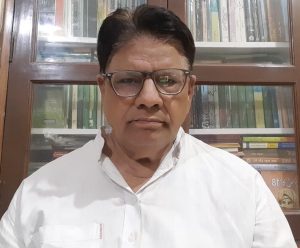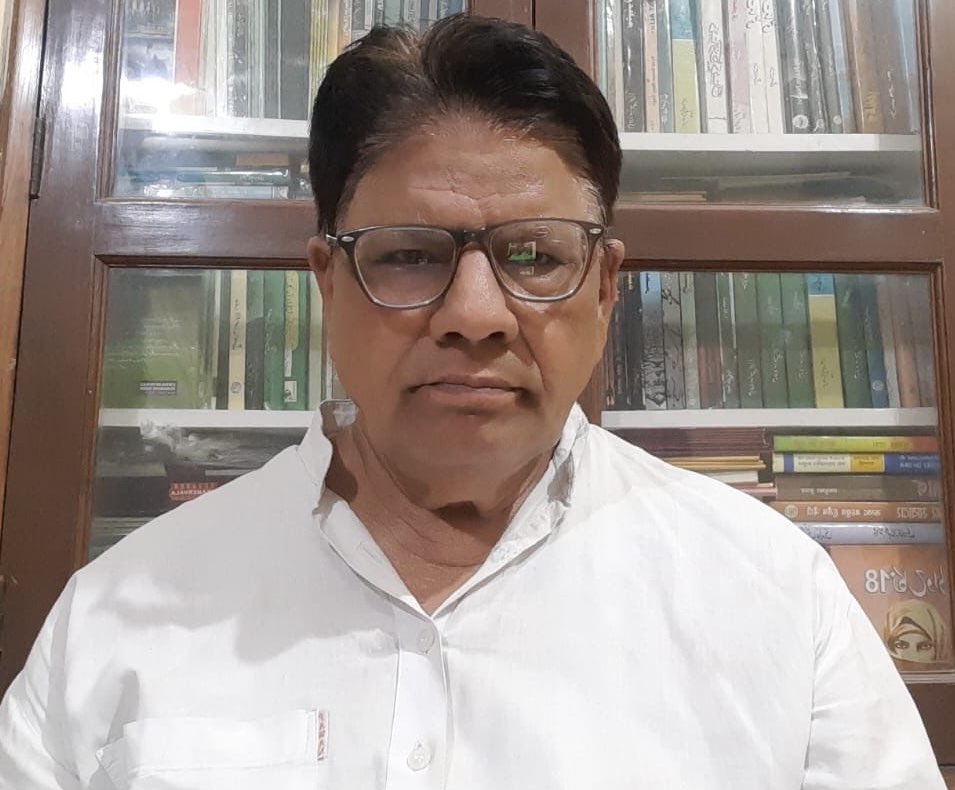Interview - Bhuvan Amrohvi

Bhuvneshwar Kumar ‘Bhuvan Amrohvi’ is a businessman and an Urdu poet keenly interested in the culture and heritage of Amroha. He wrote the first Hindi account of prominent personalities in the city –Amroha ke Gaurav, Yaade Ghamgheen, and a collection of naat and manqabat – Aqeedat ke Phool. He is working on a book about the saga of freedom fighters from the Amroha district.
Bhuvan is a resident of Katra Ghulam Ali in Amroha.
1. You learned to read and write Urdu before formally conceiving poems? How did this happen?
While researching for my book Amroha ke Gaurav, I met an inspiring personality of our time: Dr Azeem Amrohvi. Dr Azeem was a renowned marsiya writer, researcher, literary scholar, and poet. He was equally skilled in poetry and prose.
He told me that I had undertaken an important but challenging project. However, judging by my determination and devotion, he was confident of its success. He also told me that one must know Urdu to know Amroha and its people. Unfortunately, I was not well-versed in the language at that time. Although I grew up in the city, Urdu words were part of our everyday conversation.
My father, Pundit Munshilal Sharma, worked at the Municipal Board of Amroha and knew Urdu well. Sadly, I paid little attention towards learning the language.
After listening to Dr Azeem, I decided to read and write in Urdu and realised the sweetness of this language.
During my meetings with Dr Azeem, I also learned a lot about the great sacrifice of the Prophet Muhammad’s grandson, Imam Hussain and his 72 followers on the plains of Karbala, Iraq. My closeness to him inspired me to compose verses honouring Imam Hussain. When I shared my desire with Dr Azeem, he was happy to see my finished work. I wrote some seven couplets in Urdu and sought his advice. He corrected them and told me to recite them on Hussain Day, 1995, which was coming up in 15 days. I recited the following with complete confidence to a receptive audience:
My success encouraged me to continue in this field. I also started reading about Islamic history to understand it better.
And this is how my journey in religious Urdu poetry commenced and flourished by the day.
2. Where did you get the inspiration to write naat and manqabat?
We have some 50-55 programmes of naat, manqabat and salam in Amroha every year, which have inspired me a lot. I got to hone my skills under Sajjad Hussain ‘Ghamgheen Amrohvi’. He helped me find a place in the field.
After manqabat, I started writing naat, salam, nauha, and qataat. After Ghamgheen Amrohvi passed away in 2003, I became a student of Hasan Mujtaba ‘Wahid Amrohvi’. My first collection of naat and manqabat Aqeedat ke Phool was published in 2022. Enjoy these couplets from the same:
3. You founded a literary organisation, ‘Adabi Sangam’. Tell us a bit more about it.
Amroha is known for its Ganga-Jamuni culture, heritage and traditions. Pundit Ramnath Sharma ‘Raman Amrohvi’ (president), Muhammad Rafi ‘Rifat Amrohvi’ (vice-president), and I (secretary) founded the literary society Adabi Sangam Amroha in 1997 to bring poets from Hindi and Urdu on the same platform and to encourage writers and literature in the two languages. Literary gatherings have been organised under its banner, and senior writers and poets from the city are conferred the ‘Adabi Sangam Award’. These days, Wahid Amrohvi is the society’s president, I am the vice president, and Syed Qaiser Mujtaba Naqvi is the secretary.
4. Who has been your most significant influence in arts and culture?
I was highly impressed and influenced by Syed Sadequain and Jai Krishna Agarwal.
With his paintings, Sadequain made a name for himself and Amroha on a global stage. He was a fine poet, too, with command over rubaiyat. His work can be seen in India, Pakistan and Europe.
Jai Krishna Agarwal has proven his mettle internationally in fine arts. His work has been exhibited in Britain, the US, South Korea, and several other countries. He also has a deep interest in music.
5. Your book ‘Amroha ke Gaurav’ covers an exhaustive list of famus people from Amroha. What were your criteria for selecting these personalities?
I have included people from Amroha who have made a name for themselves globally. This is the first compilation of people and their achievements in Hindi. In addition, it has talent from the villages of Amroha.
6. How difficult was it to publish the book?
I never seriously considered it initially. My first challenge was profiling the personalities, which took years. I documented everything, but being an ordinary businessman, I looked for an organisation to help publish the book. It didn’t work out, and I had to self-publish it. By God’s grace, years of hard work paid off when the book came out. I consider it a priceless reward!
7. Do you want to talk about any recent developments about the city?
Few come to my mind. First, Amroha district administration organised Amroha Mahotsav 2024, a 10-day event at the stadium on Station Road. Many successful programmes were conducted during the festival, including musical evenings, kavi sammelan and mushaira. It was a historic first, and the administration has promised to make it an annual event.
Second, work is underway on a Gazetteer for the Moradabad division, which includes the districts of Moradabad, Rampur, Bijnor, Amroha, and Sambhal. The gazetteer will cover each district’s historical background, industries, tourist attractions, culture, social activities, and prominent people. It will be an important document.
Third, internationally known ocean scientist Dr Syed Wajih Ahmad Naqvi from Amroha recently received the Vigyan Shri Award from the Indian president. The city’s people are very proud and honoured.
8. Are you working on a new project?
I’m working on a book about the saga of freedom fighters (1857-1947) from the Amroha district. The book will cover the uprising of 1857, which started in Meerut, it’s reactions in Amroha, and the prominent acts of defiance by freedom fighters. If everything goes well, the book will come out soon.
Bhuvan Amrohvi in conversation with Inam Abidi Amrohvi. (November 8th, 2024)

